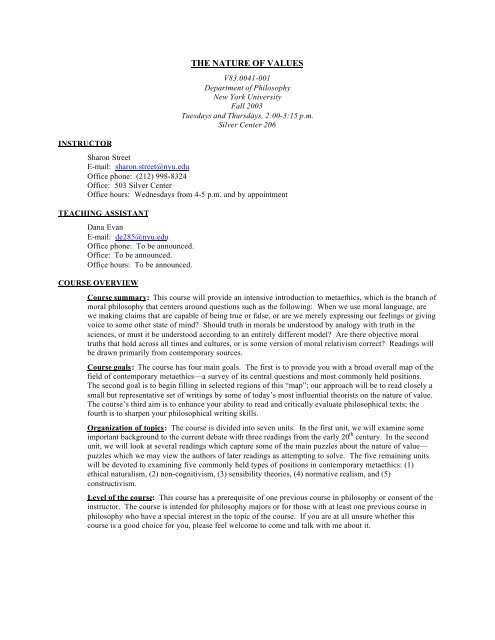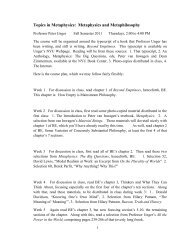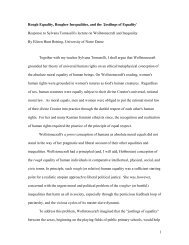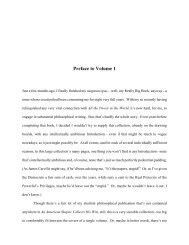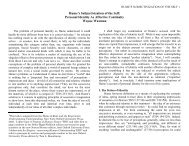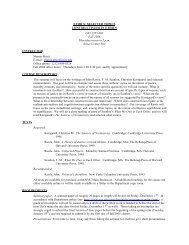The Nature of Values - New York University
The Nature of Values - New York University
The Nature of Values - New York University
You also want an ePaper? Increase the reach of your titles
YUMPU automatically turns print PDFs into web optimized ePapers that Google loves.
INSTRUCTOR<br />
THE NATURE OF VALUES<br />
V83.0041-001<br />
Department <strong>of</strong> Philosophy<br />
<strong>New</strong> <strong>York</strong> <strong>University</strong><br />
Fall 2003<br />
Tuesdays and Thursdays, 2:00-3:15 p.m.<br />
Silver Center 206<br />
Sharon Street<br />
E-mail: sharon.street@nyu.edu<br />
Office phone: (212) 998-8324<br />
Office: 503 Silver Center<br />
Office hours: Wednesdays from 4-5 p.m. and by appointment<br />
TEACHING ASSISTANT<br />
Dana Evan<br />
E-mail: de285@nyu.edu<br />
Office phone: To be announced.<br />
Office: To be announced.<br />
Office hours: To be announced.<br />
COURSE OVERVIEW<br />
Course summary: This course will provide an intensive introduction to metaethics, which is the branch <strong>of</strong><br />
moral philosophy that centers around questions such as the following: When we use moral language, are<br />
we making claims that are capable <strong>of</strong> being true or false, or are we merely expressing our feelings or giving<br />
voice to some other state <strong>of</strong> mind? Should truth in morals be understood by analogy with truth in the<br />
sciences, or must it be understood according to an entirely different model? Are there objective moral<br />
truths that hold across all times and cultures, or is some version <strong>of</strong> moral relativism correct? Readings will<br />
be drawn primarily from contemporary sources.<br />
Course goals: <strong>The</strong> course has four main goals. <strong>The</strong> first is to provide you with a broad overall map <strong>of</strong> the<br />
field <strong>of</strong> contemporary metaethics—a survey <strong>of</strong> its central questions and most commonly held positions.<br />
<strong>The</strong> second goal is to begin filling in selected regions <strong>of</strong> this “map”; our approach will be to read closely a<br />
small but representative set <strong>of</strong> writings by some <strong>of</strong> today’s most influential theorists on the nature <strong>of</strong> value.<br />
<strong>The</strong> course’s third aim is to enhance your ability to read and critically evaluate philosophical texts; the<br />
fourth is to sharpen your philosophical writing skills.<br />
Organization <strong>of</strong> topics: <strong>The</strong> course is divided into seven units. In the first unit, we will examine some<br />
important background to the current debate with three readings from the early 20 th century. In the second<br />
unit, we will look at several readings which capture some <strong>of</strong> the main puzzles about the nature <strong>of</strong> value—<br />
puzzles which we may view the authors <strong>of</strong> later readings as attempting to solve. <strong>The</strong> five remaining units<br />
will be devoted to examining five commonly held types <strong>of</strong> positions in contemporary metaethics: (1)<br />
ethical naturalism, (2) non-cognitivism, (3) sensibility theories, (4) normative realism, and (5)<br />
constructivism.<br />
Level <strong>of</strong> the course: This course has a prerequisite <strong>of</strong> one previous course in philosophy or consent <strong>of</strong> the<br />
instructor. <strong>The</strong> course is intended for philosophy majors or for those with at least one previous course in<br />
philosophy who have a special interest in the topic <strong>of</strong> the course. If you are at all unsure whether this<br />
course is a good choice for you, please feel welcome to come and talk with me about it.
<strong>The</strong> <strong>Nature</strong> <strong>of</strong> <strong>Values</strong> – Fall 2003 – Syllabus – Page 2<br />
COURSE REQUIREMENTS<br />
Lectures and class participation<br />
Lectures have two main purposes. <strong>The</strong> first is to supply background for the readings and to place them<br />
in a larger philosophical context. <strong>The</strong> second is to demonstrate, by example, how to go about<br />
identifying, analyzing, and assessing the central claims and arguments in the readings. Lectures will<br />
present key material not covered in the readings, so regular attendance is crucial if you are to do well<br />
on the papers and final exam.<br />
One <strong>of</strong> the best ways to practice the skills <strong>of</strong> analyzing and evaluating philosophical arguments is to<br />
discuss them, so we will devote a portion <strong>of</strong> most class periods to discussion. Your contributions to<br />
class discussions cannot lower your final grade, but they can improve it, especially in a borderline<br />
case.<br />
Readings<br />
Papers<br />
<strong>The</strong> reading assignments are generally short but difficult, and you will need to read them at least twice<br />
(sometimes more) if you are to achieve an adequate understanding <strong>of</strong> them. It is expected that you will<br />
have completed each reading assignment before the class meeting during which it will be discussed.<br />
This is essential if you are to get the most out <strong>of</strong> the lectures and be able to participate in discussion.<br />
Books. Two books are required for the course. Both may be purchased at the NYU Main Bookstore at<br />
18 Washington Place.<br />
• Darwall, Stephen, Allan Gibbard, and Peter Railton, eds. Moral Discourse and Practice.<br />
<strong>New</strong> <strong>York</strong>: Oxford <strong>University</strong> Press, 1997.<br />
• Korsgaard, Christine M. <strong>The</strong> Sources <strong>of</strong> Normativity. Cambridge: Cambridge <strong>University</strong><br />
Press, 1996.<br />
Coursepack. One coursepack is also required for the course. It may be purchased at Unique Copy<br />
Center at 252 Greene Street.<br />
Readings from online sources will also occasionally be assigned.<br />
Assignments. Three 5-6 page papers, each worth 25% <strong>of</strong> your final grade, will be assigned. <strong>The</strong><br />
papers are tentatively scheduled to be due as follows:<br />
• First paper due in class on Friday, October 3 rd .<br />
• Second paper due in class on Thursday, November 6 th .<br />
• Third paper due in class on Tuesday, December 9 th .<br />
Late papers. Late papers will be penalized one-third <strong>of</strong> a letter grade for each day late (for example,<br />
from A to A-, from A- to B+, and so on). Weekend days count. If you finish a late paper during a<br />
weekend, e-mail it to me right away, and turn in a hard copy later.<br />
Extensions. Extensions will not be granted except under extreme circumstances.<br />
Plagiarism. <strong>The</strong> penalty for plagiarism is an F in the course and referral to the dean. If you have any<br />
questions about what constitutes plagiarism, please see the Statement on Academic Integrity at<br />
http://www.nyu.edu/cas/map/integrity.html. Consult me or Dana if you have further questions.<br />
Final exam<br />
<strong>The</strong> final exam, worth 25% <strong>of</strong> your final grade, is scheduled for noon-1:50 p.m. on Tuesday,<br />
December 16 th . <strong>The</strong> exam will consist <strong>of</strong> quotation identifications and essay questions. <strong>The</strong> essay
<strong>The</strong> <strong>Nature</strong> <strong>of</strong> <strong>Values</strong> – Fall 2003 – Syllabus – Page 3<br />
questions will be drawn from a larger set <strong>of</strong> study questions that will be distributed on the last day <strong>of</strong><br />
class.<br />
CALENDAR OF ASSIGNMENTS<br />
This calendar may be revised as the semester progresses. Readings followed by “(MDP)” are in Darwall,<br />
Gibbard, and Railton’s Moral Discourse and Practice.<br />
Introduction to the Course<br />
Tuesday, September 2 nd<br />
• No assignment<br />
Unit 1: Background to the Current Debate<br />
Thursday, September 4 th<br />
• G. E. Moore, selection from Principia Ethica (MDP)<br />
Tuesday, September 9 th<br />
• A. J. Ayer, Chapter 6 <strong>of</strong> Language, Truth, and Logic (coursepack)<br />
Thursday, September 11 th<br />
• Charles Stevenson, “<strong>The</strong> Emotive Meaning <strong>of</strong> Ethical Terms” (MDP)<br />
Unit 2: Problems<br />
Tuesday, September 16 th<br />
• J. L. Mackie, selection from Ethics: Inventing Right and Wrong (MDP)<br />
Thursday, September 18 th<br />
• Gilbert Harman, “Ethics and Observation” (MDP)<br />
• Begin reading Gilbert Harman, “Is <strong>The</strong>re a Single True Morality?” (coursepack)<br />
Tuesday, September 23 rd<br />
• Finish reading Gilbert Harman, “Is <strong>The</strong>re a Single True Morality?” (coursepack)<br />
Unit 3: Ethical Naturalism<br />
Thursday, September 25 th<br />
• Begin reading Nicholas Sturgeon, “Moral Explanations” (coursepack)<br />
Tuesday, September 30 th<br />
• Finish reading Nicholas Sturgeon, “Moral Explanations” (coursepack)<br />
Thursday, October 2 nd<br />
• NO CLASS. A MAKE-UP MEETING WILL BE HELD ON FRIDAY, OCTOBER 3 RD<br />
FROM 2:00-3:15 P.M. IN OUR REGULAR CLASSROOM.<br />
Friday, October 3 rd<br />
• Begin reading Peter Railton, “Moral Realism” (MDP)<br />
• FIRST PAPER IS TENTATIVELY SCHEDULED TO BE DUE.<br />
Tuesday, October 7 th<br />
• Finish reading Peter Railton, “Moral Realism” (MDP)
<strong>The</strong> <strong>Nature</strong> <strong>of</strong> <strong>Values</strong> – Fall 2003 – Syllabus – Page 4<br />
Thursday, October 9 th<br />
• Don Loeb, “Full-Information <strong>The</strong>ories <strong>of</strong> Individual Good” (coursepack)<br />
Tuesday, October 14 th<br />
• Connie Rosati, “Naturalism, Normativity, and the Open Question Argument” (available<br />
online at http://links.jstor.org/sici?sici=0029-<br />
4624%28199503%2929%3A1%3C46%3ANNATOQ%3E2.0.CO%3B2-W)<br />
Unit 4: Contemporary Non-Cognitivism<br />
Thursday, October 16 th<br />
• Simon Blackburn, “How To Be an Ethical Antirealist” (MDP)<br />
Tuesday, October 21 st<br />
• Begin reading Allan Gibbard, précis <strong>of</strong> Wise Choices, Apt Feelings (MDP)<br />
Thursday, October 23 rd<br />
• Finish reading Allan Gibbard, précis <strong>of</strong> Wise Choices, Apt Feelings (MDP)<br />
• Begin reading Allan Gibbard, Chapter 6 <strong>of</strong> Wise Choices, Apt Feelings (coursepack)<br />
Tuesday, October 28 th<br />
• Finish reading Allan Gibbard, Chapter 6 <strong>of</strong> Wise Choices, Apt Feelings (coursepack)<br />
Unit 5: Sensibility <strong>The</strong>ories<br />
Thursday, October 30 th<br />
• John McDowell, “<strong>Values</strong> and Secondary Qualities” (MDP)<br />
Tuesday, November 4 th<br />
• John McDowell, “Projection and Truth in Ethics” (MDP)<br />
Unit 6: Normative Realism<br />
Thursday, November 6 th<br />
• Thomas Nagel, “Value” (available online at<br />
http://www.tannerlectures.utah.edu/lectures/nagel80.pdf; read pp. 23-43/97-117 <strong>of</strong> the<br />
PDF file)<br />
• SECOND PAPER IS TENTATIVELY SCHEDULED TO BE DUE.<br />
Tuesday, November 11 th<br />
• Begin reading Ronald Dworkin, “Objectivity and Truth: You’d Better Believe It”<br />
(available online at http://links.jstor.org/sici?sici=0048-<br />
3915%28199621%2925%3A2%3C87%3AOATYBB%3E2.0.CO%3B2-X)<br />
Thursday, November 13 th<br />
• Finish reading Ronald Dworkin, “Objectivity and Truth: You’d Better Believe It”<br />
(available online at http://links.jstor.org/sici?sici=0048-<br />
3915%28199621%2925%3A2%3C87%3AOATYBB%3E2.0.CO%3B2-X)<br />
Unit 7: Constructivism<br />
Tuesday, November 18 th<br />
• Christine Korsgaard, <strong>The</strong> Sources <strong>of</strong> Normativity, selections from Lecture 1
<strong>The</strong> <strong>Nature</strong> <strong>of</strong> <strong>Values</strong> – Fall 2003 – Syllabus – Page 5<br />
Thursday, November 20 th<br />
• Christine Korsgaard, <strong>The</strong> Sources <strong>of</strong> Normativity, selections from Lecture 2<br />
Tuesday, November 25 th<br />
• Begin reading Christine Korsgaard, <strong>The</strong> Sources <strong>of</strong> Normativity, Lecture 3<br />
Thursday, November 27 th<br />
• NO CLASS. THANKSGIVING HOLIDAY.<br />
Tuesday, December 2 nd<br />
• Finish reading Christine Korsgaard, <strong>The</strong> Sources <strong>of</strong> Normativity, Lecture 3<br />
Thursday, December 4 th<br />
• Begin reading Christine Korsgaard, <strong>The</strong> Sources <strong>of</strong> Normativity, Lecture 4<br />
Tuesday, December 9 th<br />
• Finish reading Christine Korsgaard, <strong>The</strong> Sources <strong>of</strong> Normativity, Lecture 4<br />
• THIRD PAPER IS TENTATIVELY SCHEDULED TO BE DUE.<br />
• FINAL EXAM STUDY QUESTIONS WILL BE DISTRIBUTED; FINAL EXAM IS<br />
ON TUESDAY, DECEMBER 16 TH , FROM NOON-1:50 P.M.


